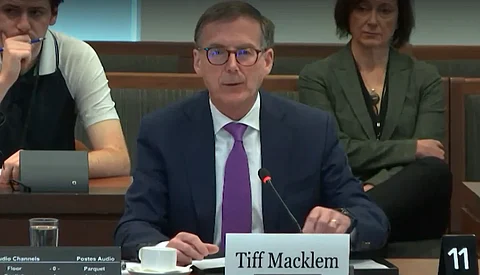Bank of Canada governor says consequences of tariffs will be severe
Tiff Macklem, governor of the Bank of Canada is warning Canadians the country faces strong economic head winds if the US applies broad-based tariffs in March, as US President Donald Trump has said it will.
Speaking to the Mississauga Board of Trade on Friday, Macklem said tariffs would stifle growth, weaken the Canadian dollar and put upward pressure on inflation if a prolonged trade war develops, especially if Canada retaliates with tariffs of its own, as Prime Minister Justin Trudeau has said it would.
“Increased trade friction with the United States is a new reality,” he said, adding the shock to the Canadian economy wouldn’t be short-lived.
“The economic consequences of a protracted trade conflict would be severe. If tariffs are long-lasting and broad-based, there won’t be a bounce-back. We may eventually regain our current rate of growth, but the level of output would be permanently lower.”
Tariffs would lead to an immediate decline in exports, resulting in production cuts and job losses, said Macklem.
“Exports fall by 8.5% in the year after the tariffs take effect,” he said, based on current bank models, adding that business investment would also contract by nearly 12% due to higher costs and reduced confidence.
Retaliatory tariffs would drive-up prices for many imported goods.
“Roughly 13% of Canada’s CPI basket is made up of goods imported from the United States,” Macklem said, adding a weaker Canadian dollar would only compound the problem by making all imported goods more expensive.
The Bank of Canada has been on a path of lowering its rate as inflation moves into its target range of 1% to 3%, with the policy rate now well below its recent highs.
Lower rates could help support domestic demand in Canada, but the bank would have limited ability to effectively shield the economy from trade shocks and it would have to tread carefully to avoid stoking inflation, said Macklem.
“Monetary policy can help smooth the adjustment by supporting demand so it doesn’t weaken too much more than supply. But how much support monetary policy can provide is constrained by the need to control inflation,” he said.
“Monetary policy cannot restore lost supply or fully offset the economic damage. The initial impact of tariffs is a one-time rise in the level of consumer prices. Monetary policy cannot change that.”
A weaker economy could prompt the bank to cut rates further but if inflation starts rising again due to rising prices of imports, the bank might be put in the position of holding rates higher than expected.
“Simply put, monetary policy needs to ensure the increase in inflation is temporary,” said Macklem.
In addition, he said Canada needs internal changes to counteract the negative effects of a trade war, including reducing or removing interprovincial trade barriers and investments in better east-west transportation links to expand access to overseas markets.
“Provinces could also make it easier for workers to move within Canada by mutually recognizing different labour accreditations,” said Macklem.
“The Bank has previously highlighted Canada’s productivity challenge, and it’s good to see more focus by federal and provincial governments on structural reforms to increase productivity and investment by strengthening our economic union.”
“It is not for the Bank of Canada to prescribe these policies or investments. But higher productivity means higher potential output and more capacity for growth without inflation. As Canada confronts the reality of increased trade friction with the United States, a concerted focus on productivity has rarely been more important.”


